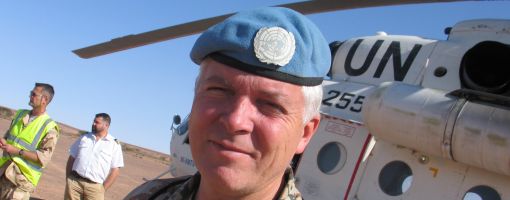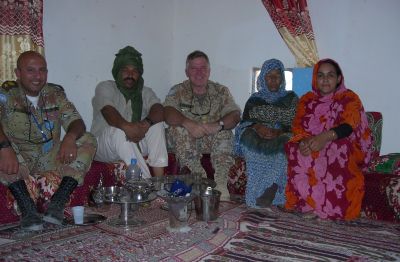
The former military chief of the UN mission in Western Sahara believes the UN must stand firmer on the claim for a referendum on independence. "But some permanent members of the Security Council have not wanted to push too hard for this" said Kurt Mosgaard, MINURSO Force Commander 2005-2007. Mosgaard is interviewed in a recent report from the Norwegian Refugee Council.
Extract from Norwegian Refugee Council's thematic report "Occupied Country, displaced people", March 2008
As long as Morocco opposes the referendum, the UN process finds itself up a blind alley. Even seven years of James Baker serving as the UN's Special Envoy were not enough to obtain a solution which respected the rights of Sahrawis. Despite previous agreements to hold a referendum which would include the possibility of independence, Morocco now declines to accept these. So it is back to square one. A 17-year-long UN-led process has failed to lead to any political breakthrough at all.
Kurt Mosgaard, the former UN Force Commander of its mission in Western Sahara, MINURSO, believes the UN must react. He says the UN needs to be clearer in its demands, and that it is high time for the referendum on independence for Western Sahara to be held. He is thereby critical of Morocco's rejection of a referendum.
"The UN should state that the referendum on Western Sahara must encompass the possibility of independence. Of course the referendum must include this alternative. You only need a normal level of insight to understand this," says Mosgaard in an interview with the NRC.
Realpolitik
The Danish Major-General was Force Commander of MINURSO from 2005- 2007. He now holds a senior position in the Danish military, and has some clear opinions on the failed UN process. He believes that "commercial thinking and classic realpolitik" are the major reasons why a solution on Western Sahara has never been arrived at.
"Some of the permanent members of the Security Council have had links with one of the parties concerned, which has meant they didn't want to apply too much pressure. I am a very strong supporter of the UN, but I also think it has some weaknesses. The UN must have a position, and one shouldn't always opt for the easiest solution," says Mosgaard.

The Dane himself has shown an ability to act. When he was Force Commander for MINURSO, he gave the order that the Moroccan flag over the UN building should be lowered for good. The flag had caused great irritation to many Sahrawis and UN staff, but none of his predecessors up to that point had dared to take it down. This small but very symbolic act was to make him most unpopular in Moroccan circles.
"The matter is simple. The UN is clear that Western Sahara is a territory whose status is still unclear. So it is unacceptable that a Moroccan flag should fly above the UN building. It goes directly against our mandate. I don't know how this can have continued for 16 years without anyone having taken action", he says. He says that the flag issue is one of many instances of the UN saying one thing in New York, but often playing a different role in practice.
Time to get tough
After 17 years of dialogue between the parties, with a frustrated and isolated population in the Algerian desert, and 45 million dollars in annual costs to the MINURSO mission, the Major General thinks that the UN has spent far too long trying to find a solution. The chief problem, he maintains, lies in the choice having been made to adhere to Chapter VI of the UN Charter on a peaceful solution acceptable to both parties.
"It is high time the UN got tough and spoke out more clearly. If the UN does not deviate from Chapter VI, another 30 years will go by of maintaining the status quo", says Mosgaard. If the Security Council goes a step further and makes use of Chapter VII, it mandates the use of force by UN member states to create peace. This is the course taken when it is seen that a peaceful solution to a conflict is not forthcoming, and the situation is a threat to international peace and security. When Iraq occupied Kuwait in 1990, and the UN went to the military defence of the country, the Security Council invoked Chapter VII, and since 1990 well over 100 resolutions have been adopted in accordance with Chapter VII.
However, the Security Council has been unwilling to do the same when it comes to Morocco's occupation of Western Sahara since 1975.
"United Nothing"
The main task of the MINURSO force was to oversee the ceasefire. This part of the agreements between Polisario and Morocco has been a great success. Mosgaard says that despite everything the two parties cooperate well with the UN on this part of the agreement.
"At the same time, some will perhaps say that the ceasefire only postpones the problem, as it was, after all, only meant to be an interim solution while awaiting a permanent political solution."
On the other hand, MINURSO has no mandate to intervene or to report on human rights violations in Western Sahara. For several years Polisario has been calling for MINURSO to have the right and the duty to protect the civilian population against such violations. Norwegian Foreign Affairs Minister Jonas Gahr Støre hasalso called for MINURSO's mandate to be broadened, but the subject has never been
opened for debate by the Security Council. So the mission stands back as a "silent witness to grave abuses of human rights", according to Amnesty.
Despite the ceasefire, the Sahrawis maintain that the UN presence has been a fiasco. For many of them, it was unacceptable to lay down their weapons at all back in 1991 in favour of a referendum.
Now they see that Polisario's strategy may have been a failure and that the UN is not in a position to push ahead for a solution. The Sahrawis are merciless in their criticism: "UN stands for United Nothing," they say in the refugee camps in Algeria.
Mosgaard is nevertheless certain that another war will not provide a solution, and that neither Polisario nor Morocco could emerge as victors. "On the contrary, another war could lead to unrest throughout North West Africa. It would cost many lives on both sides, and cause new waves of refugees. Morocco would be severely affected economically, and there would always be the risk that a war would involve the neighbouring countries. Every day without war is a good day," says Mosgaard.
Order our Western Sahara poster!
“Try to Visit Western Sahara”…
The Security Council fails Western Sahara and international law
On 31 October 2025, a new resolution was adopted in the UN Security Council calling on the Saharawis to negotiate a solution that would entail their incorporation into the occupying power, Morocco.
Saharawis Demonstrate Against Trump Proposal
The United States has proposed in a meeting of the UN Security Council on Thursday that the occupied Western Sahara be incorporated into Morocco.
Skretting Turkey misled about sustainability
Dutch-Norwegian fish feed giant admits using conflict fishmeal from occupied Western Sahara. Last month, it removed a fake sustainability claim from its website.



